'We all deserve an opportunity' - riders react as two trans women finish in CX Nationals top 5
What does the sixth place finisher think? “I think we all raced well."
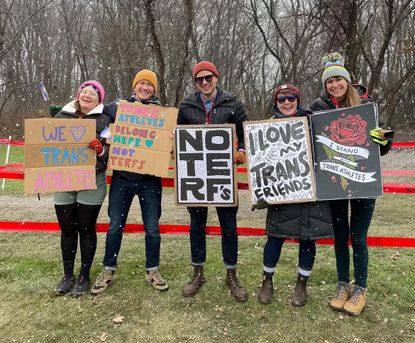

Ahead of the 2022 USA Cycling National Cyclocross Championships in Hartford, CT, this past week, organizers, racers and fans alike braced themselves for another showing of protests against trans athletes competing in women’s categories.
During the 2021 championship event in Illinois, a group of “Save Women’s Sport” demonstrators took to the cyclocross grounds holding signs and heckling trans athletes.
The group is “a coalition that fights to preserve sex-based eligibility standards for participation in female sports” and strongly opposes USA Cycling’s admission of trans women athletes in its women’s races.
The protests at that time were part of a nation-wide campaign that had sparked a social media outrage. Some condemned the protestors, but most condemned cycling’s governing body, USA Cycling, for either not putting a stop to the protests or conversely, for allowing trans women to compete in the women’s categories.
This led to USA Cycling amending its Fan Code of Conduct this year to include prohibiting “displaying signs, symbols, images, using language, or making gestures that are threatening, abusive, or discriminatory on the basis of race, ethnicity, national origin, religion, gender, gender identity, ability, or sexual orientation.”
In the end, the pre-event worries never materialized. Instead, last year’s hostilities led to a showing of love and support with images of kids in rainbow hats and signs bearing “We love our trans athletes” messages coming out of Hartford this year.
Online, however, the anti-transgender sentiment and protests continued across social media. Twitter in particular was a buzz after Austin Killips (Nice Bikes) —a target of last year’s protests— made history when she rode herself into the bronze medal in the women’s elite race behind three-time winner Clara Honsinger (EF Education-Tibco-SVB) and Raylyn Nuss (Steve Tilford Foundation Racing), thereby becoming the first transgender woman to podium at this event. Jenna Lingwood (Point S Nokian), another trans athlete, rounded out the top five.
Get The Leadout Newsletter
The latest race content, interviews, features, reviews and expert buying guides, direct to your inbox!
“We braced for the worst but the only energy that filled Riverside Park was love and support for everyone racing their hearts out. Sometimes, thanks to careful planning and kind souls the best possible outcomes happen,” Killips commented in a post-race message.
“I just want to live in and help make a world marked by love, solidarity, and grace and the cyclocross community was able to realize that for an afternoon here. I'll hold days like this close to my heart when my faith in the goodness of others wavers.”
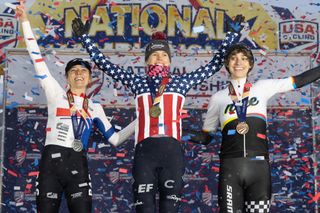
With two trans women in the top five of the cyclocross national championships, transgender athletes have rarely been so visible. And while the internet is easily incensed, the question of fairness in competition ought to be posed to the athletes currently competing with and alongside trans athletes.
And so, Cycling Weekly reached out to Anna Megale of Comp Edge Racing, who finished just outside the top-five in sixth place.
When asked if it matters to her just who the five racers in front of her are, Megale responded with a simple, “no it doesn't.”
“This is a super hard topic and there's a little part of me that feels conflicted on what women athletics should and shouldn't be but at the end of the day, I'm super supportive of all athletes out there,” the 32-year-old Oregon native said.
“I think we all deserve an opportunity. I'm so happy for all five athletes and I'm proud of them. I think they worked just as hard for it as anyone else did. This is what the game is right now so, what does the sixth person think? I think we all raced well."
Fifth at last year’s event and sixth this year, Megale has been a consistent performer since breaking through the UCI ranks.
She grew up a swimmer and like so many cyclists out there, started cycling due to an injury. She was introduced to bike racing by her husband in 2014, and quickly started making her way through the local scene in Boise, Idaho.
In 2018 she began tackling national level UCI races, chasing that first UCI point. She garnered an impressive 57 UCI points that first year and by the end of the 2021/22 season, she was sporting a USA skinsuit and lining up at the UCI World Cyclocross Championships.
Megale said the controversy and protests surrounding nationals these past two years not only detract from the racing, she also fears for her fellow competitors’ safety.
“I'm glad USAC put out a Code of Conduct for that because it's scary. I worry that it's not safe and I want it to be safe for everyone,” she commented
“I truly believe we all need a safe place to discuss this topic. I want all people, no matter who they are, to feel heard and loved. Like most things, there is no perfect answer and continuing to work towards fairness for all is most important. I am grateful for my cycling community and feel every athlete I have lined up with this year has raised the bar and pushed us all to be better. Most importantly, there is no room for hate, ever."
Ahead of the race, Pan American Champion, Raylyn Nuss, called the trans athlete debate "the big elephant in the room” and also championed further discourse on the matter.
"I almost wish we could just have a panel discussion with [the trans women] in a safe space. And we could all just ask a bunch of questions, and just clear the air more or less, and then just proceed on as normal,” she told Cyclingnews.
"The rules are what they are. So we cannot sit and just think about what advantages she might have."
These rules Nuss is referring to is the UCI's policy on eligibility and regulations for transgender athletes, which USA Cycling has adopted. Last revised in July 2022, these regulations state that those who transition from male to female (MTF) are eligible to compete in the female category as long as:
- the athlete has declared their gender identity as female,
- the athlete can demonstrate that their total testosterone level in serum has been below 2.5 nmol/L for a period of at least 24 months,
- and their total testosterone level in serum must remain below 2.5 nmol/L throughout the period of desired eligibility to compete in the female category.
Not all cycling nations have adopted this policy, which has led to conflict and confusion for elite trans athletes. British Cycling even went so far as to block trans riders from competing until it has reviewed and decided on a new licensing policy.
In the U.S. however, trans women are allowed to compete at all levels as long as qualifications are met, and for most cis women riders in the field, it's an accepted addition of competition.
"[Trans women] are just competitors that I want to beat every single time I go to the line, someone that's strong, and is really giving me a run for my money," Nuss commented.
With the national championships now behind them, a contingent of American racers, including Megale, Honsinger, Nuss and Killips, now head to Europe for a block of racing. The riders will contest celebrated events like Superprestige Diegem, X2O Trofee Koksijde and the UCI World Cup in Zonhoven.

Thank you for reading 20 articles this month* Join now for unlimited access
Enjoy your first month for just £1 / $1 / €1
*Read 5 free articles per month without a subscription

Join now for unlimited access
Try first month for just £1 / $1 / €1

Cycling Weekly's North American Editor, Anne-Marije Rook is old school. She holds a degree in journalism and started out as a newspaper reporter — in print! She can even be seen bringing a pen and notepad to the press conference.
Originally from The Netherlands, she grew up a bike commuter and didn't find bike racing until her early twenties when living in Seattle, Washington. Strengthened by the many miles spent darting around Seattle's hilly streets on a steel single speed, Rook's progression in the sport was a quick one. As she competed at the elite level, her journalism career followed, and soon she became a full-time cycling journalist. She's now been a cycling journalist for 11 years.
-
 A Stars and Stripes jersey and cold hard cash: the 2024 Gravel National Championships to offer a $40,000 prize purse for elite races
A Stars and Stripes jersey and cold hard cash: the 2024 Gravel National Championships to offer a $40,000 prize purse for elite racesThe US Gravel National Championships will return to Gering, Nebraska, on September 8
By Anne-Marije Rook Published
-
 Tadej Pogačar broke 288 Strava KOMs during Tour de France victory
Tadej Pogačar broke 288 Strava KOMs during Tour de France victorySlovenian won his third Tour title in Nice last weekend, and picked up a host of new trophies on Strava
By Tom Thewlis Published
-
 US Pro Nationals: EF Pro Cycling dominates the races, netting 3 titles and 6 medals
US Pro Nationals: EF Pro Cycling dominates the races, netting 3 titles and 6 medalsCharleston, the new host, offered up one of the toughest courses in recent history. Read how the racing unfolded
By Henry Lord Published
-
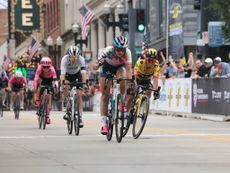 US Pro Nationals: your guide to livestreams, who to watch and what to know about the all-new race courses
US Pro Nationals: your guide to livestreams, who to watch and what to know about the all-new race coursesFor the first time in six years, the U.S. National Road Race Championships has moved to a new host, Charleston, West Virginia. The change brings fresh courses ready to crown new national champions.
By Henry Lord Published
-
 Trek USCX will host 4 consecutive UCI cyclocross race weekends on US soil
Trek USCX will host 4 consecutive UCI cyclocross race weekends on US soilTrek becomes American UCI Cyclocross series title sponsor, adding a fourth race to the series in October at its headquarters in Waterloo, Wisconsin.
By Kristin Jenny Published
-
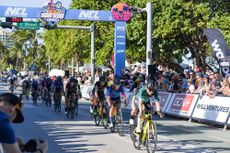 Dozens of riders left stranded as National Cycling League announces 2024 season hiatus citing 'current economic challenges in domestic and global cycling industry'
Dozens of riders left stranded as National Cycling League announces 2024 season hiatus citing 'current economic challenges in domestic and global cycling industry'Effective immediately, the NCL paused all its operations in order to focus on restructuring and rebuilding for the 2025 season.
By Anne-Marije Rook Published
-
 Joe Martin Stage Race, the longest-held stage race in America, postponed until 2025 due to rising costs
Joe Martin Stage Race, the longest-held stage race in America, postponed until 2025 due to rising costsA big loss for domestic elites and amateurs alike, the Joe Martin Stage Race was one of just four UCI races remaining on US soil.
By Anne-Marije Rook Published
-
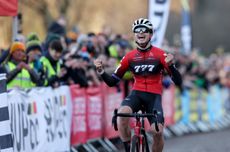 'I love going to charity shops with loads of grannies': British national champion on his favourite hobby
'I love going to charity shops with loads of grannies': British national champion on his favourite hobbyIn this Q&A, Cameron Mason tells Cycling Weekly about his earliest cycling memories, a once-in-a-lifetime trip to South Africa, and browsing clothes racks with grannies
By Tom Thewlis Published
-
 The 'Met Gala of US Track Cycling' draws stars and dignitaries in support of the sport's youth
The 'Met Gala of US Track Cycling' draws stars and dignitaries in support of the sport's youthStar Track is an intersection of cycling legends, luminaries and policymakers from all corners of the cycling world, united in a singular focus of a successful tomorrow
By Christopher Schwenker Published
-
 New trans athlete policy 'sets a dangerous precedent': Washington racer seeks state action against USA Cycling
New trans athlete policy 'sets a dangerous precedent': Washington racer seeks state action against USA CyclingWhen USA Cycling introduced its revised Transgender Athlete Participation Policy earlier this month, the new two-tiered system didn’t sit well with all racers.
By Anne-Marije Rook Published